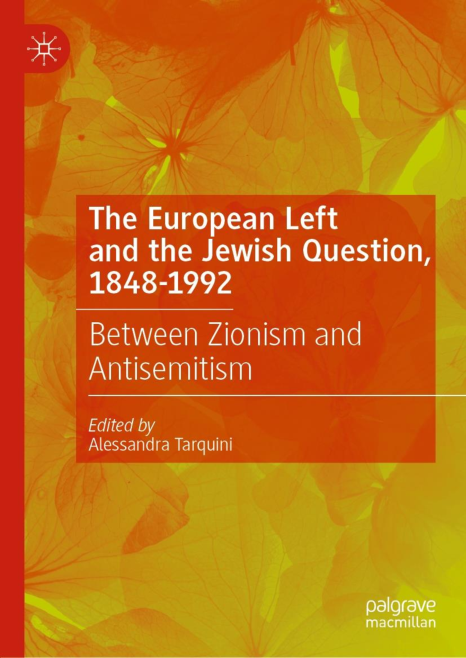Australia/Israel Review
Biblio File: Socialism’s Jewish question
Feb 2, 2022 | Colin Schindler
 The European Left and the Jewish Question, 1848-1992: Between Zionism and Antisemitism
The European Left and the Jewish Question, 1848-1992: Between Zionism and Antisemitism
Alessandra Tarquini (editor), Springer Nature Switzerland AG, 348 pp., A$264.75
This book of accessible essays by specialists examines the Jewish question, not internally from the perspective of Jews themselves, but externally by European socialist thinkers.
Since Zionism was a singular ideology and did not fit into accepted theory, many socialists such as Soviet leader Vladimir Lenin dismissed it out of hand. This did not always imply antisemitism but more a blind and political rejection of Zionist ideology.
In this detailed tome, French historian Michel Dreyfus pinpoints the affair of his namesake, Alfred Dreyfus, in the early 20th century as a turning point in the relationship between the Left and the Jews. He lists five different forms of antisemitism on the Left. He interestingly describes how pacifism in the 1930s – as a reaction to the slaughter in the trenches during World War I – became “a vector of antisemitism.”
In those pre-Shoah days, Jews were seen by some pacifists as pushing for and provoking a war with Hitler.
In his chapter, Andrea Pinazzi dissects the views of Antonio Gramsci, the well-known Italian socialist theorist, on the Jewish question through his letters to his sister-in-law. Gramsci comes over as profoundly superficial. He died in Mussolini’s prisons in 1937 just before anti-Jewish legislation was introduced in Italy. Would this have changed Gramsci’s views if he had lived?
The last part of this book is devoted to “the Israel Question” and covers familiar topics. Gregorio Sorgonà however breaks new ground in describing the influence of Mao’s China on the New Left in the 1960s. After the Soviet-Chinese schism, Beijing regarded both the USSR and the US as imperialist. Mao deemed the Middle East as fertile territory for a new anti-imperialist struggle after Vietnam.
As many writers in this book indicate, the Left was never monolithic, but too many of its component parts were remarkably limited when it came to the Jewish question. Lenin was ignorant of the suffering of the Jewish masses in Tsarist Russia and knew nothing about the socialist Zionism of figures such as Moses Hess, Nachman Syrkin and Ber Borochov. Lenin’s indifference however was superseded by Stalin’s ingrained antisemitism and his chosen instrument of slow death, the Gulag Archipelago.
The early writings of Karl Marx are still seen by many as exuding “a contempt for the Jews.” This cemented the link between Jewish landlords and speculators for succeeding generations such as the German New Left, a hundred years later
Pierre-Joseph Proudhon, the French socialist philosopher, a 19th century contemporary of Marx, was unapologetically antisemitic.
As several contributors to this book remark, socialism took on the form of a quasi-religion. Belief rather than analysis became the centrepiece of endeavour. For many, Jews simply did not count when it came to discrimination.
Several authors highlight external factors that have influenced groups on the Left. The Spanish Left imbibed ideas at the altar of historical anti-Judaism during the Inquisition. The Christian Left promoted the vision of a Jesus who identified with the poor – and thereby with the Palestinian refugees.
In France during the 1950s, many embraced anti-colonialism and supported the National Liberation Front’s struggle for independence in Algeria. Decolonisation during the 1960s allowed the New Left in Europe to identify more with the nascent Palestinian national movement than with the Israeli one – and this was before the West Bank settlement drive.
In an effort to express solidarity with discriminated Muslim minorities in Europe, some on the French Left maintain a mistaken silence about the reactionary politics of the Islamists. And anti-Zionism sometimes tips over into overt antisemitism. There were antisemitic killings in Toulouse, Montauban and Vincennes in recent times.
This volume is unusual because it goes into the origins of contemporary antisemitism and anti-Zionism within the European Left, mainly in France and Italy. Pushing the slogans and clichés of campaigners against antisemitism to one side, it looks at the roots of the problem today.
Colin Shindler is an Emeritus Professor at the School of Oriental and African Studies, University of London and founding chairman of the European Association of Israel Studies. He is the editor of Israel and the World Powers (I. B. Tauris/ 2014). © Jerusalem Post (www.jpost.com), reprinted by permission, all rights reserved.
Tags: Antisemitism, Europe, Israel, Zionism
RELATED ARTICLES

AIJAC expresses strong support for US-Israeli military efforts against Iran





